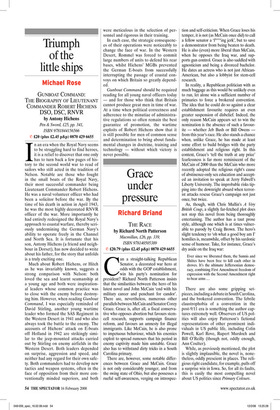Grace under pressure
Richard Briand
THE RACE by Richard North Patterson Macmillan, £26, pp. 339, ISBN 978140505389 ✆ £20.79 (plus £2.45 p&p) 0870 429 6655 Can a straight-talking Republican Senator, a decorated war hero at odds with the GOP establishment, win his party’s nomination for president? Richard North Patterson insists that the similarities between the hero of his latest novel and John McCain ‘end with his military career and penchant for candor’. There are, nevertheless, numerous other parallels between McCain and Senator Corey Grace. Grace is, after all, a fiscal conservative who opposes abortion but favours stemcell research, supports campaign finance reform, and favours an amnesty for illegal immigrants. Like McCain, he is also prone to impetuous behaviour, which his enemies exploit to spread rumours that his period in enemy captivity made him unstable. Grace also has to withstand dirty tricks in a South Carolina primary.
There are, however, some notable differences between Grace and McCain. Grace is not only considerably younger, and from the swing state of Ohio, but also possesses a rueful self-awareness, verging on introspec tion and self-criticism. When Grace loses his temper, it is not (as McCain once did) to call a fellow senator a ‘f***ing jerk’, but to save a demonstrator from being beaten to death. He is also (even) more liberal than McCain, when he opposes the Iraq war, and supports gun control. Grace is also saddled with agnosticism and being a divorced bachelor. He dates an actress who is not just AfricanAmerican, but also a lobbyist for stem-cell research.
In reality, a Republican politician with as much baggage as this would be unlikely even to run, let alone win a sufficient number of primaries to force a brokered convention. The idea that he could do so against a clear establishment favourite requires an even greater suspension of disbelief. Indeed, the only reason McCain appears set to win the nomination is the absence of such a favourite — whether Jeb Bush or Bill Owens — from this year’s race. He also stands a chance when, unlike Grace, he has made at least some effort to build bridges with the party establishment and religious right. In this context, Grace’s ‘tell the truth at any price’ fearlessness is far more reminiscent of the McCain of 2000 than the McCain who more recently adopted the religious right’s cause of abstinence-only sex education and accepted an invitation to speak at Jerry Falwell’s Liberty University. The improbable risks tipping into the downright absurd when terrorist attacks rescue Grace’s campaign not just once, but twice.
As, though, with Chris Mullin’s A Very British Coup, a slightly far-fetched plot does not stop this novel from being thoroughly entertaining. The author has a taut prose style, although one which is at times vulnerable to parody by Craig Brown. The hero’s slight tendency to ‘oh what a good boy am I’ homilies is, meanwhile, offset by his sardonic sense of humour. Take, for instance, Grace’s dry aside on the Iraq war:
Ever since we liberated them, the Sunnis and Shiites have been free to kill each other in droves. It’s the ultimate Jeffersonian democracy, combining First Amendment freedom of expression with the Second Amendment right to bear arms ...
There are also some gripping setpieces, including a debate in South Carolina, and the brokered convention. The febrile claustrophobia of a convention in the post-9/11 era is something the author captures extremely well. Observers of US politics will also enjoy Patterson’s fictional representations of other prominent individuals in US public life, including Colin Powell, Karl Rove, Rupert Murdoch and Bill O’Reilly (though not, oddly enough, Ann Coulter).
While, as previously mentioned, the plot is slightly implausible, the novel is, nonetheless, oddly prescient in places. The religious right candidate, for example, pulls off a surprise win in Iowa. So, for all its faults, this is easily the most compelling novel about US politics since Primary Colours.


















































































 Previous page
Previous page